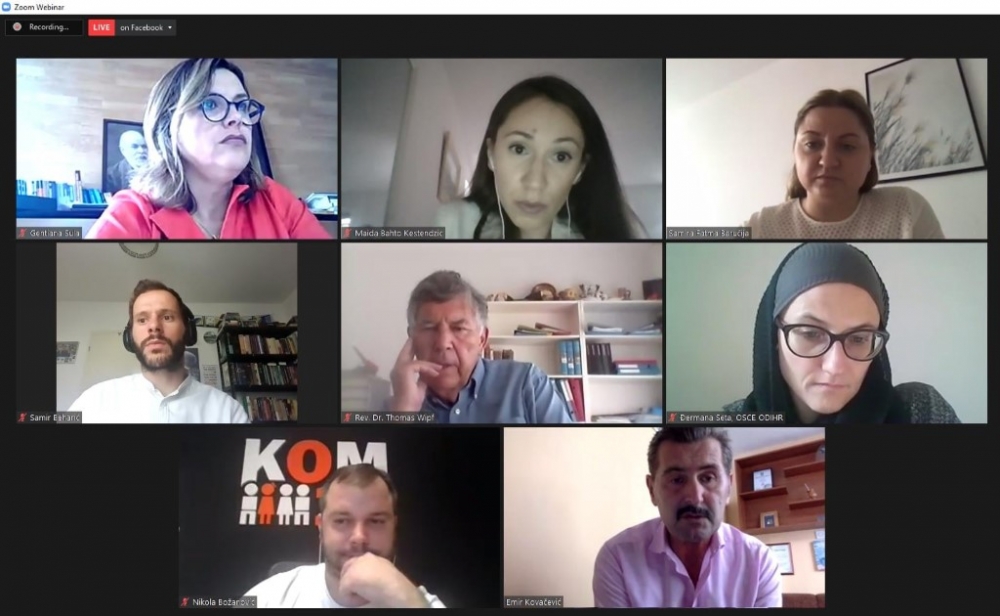The International Day of Peace has been celebrated on September 21st since 1981 when it was established at the General Assembly of the United Nations. The theme of this year's Peace Day was "Shaping Peace Together". Youth for Peace team saw this day as a great opportunity to launch the #ALTerHate campaign, which will focus on combating hate speech. This is a topic that is inexhaustible, and especially current in the time in which we live, given the widespread use of social networks, but also global events that, unfortunately, are increasingly encouraging the emergence of hate speech across our planet. On the occasion of the International Day of Peace, a webinar on the topic "Towards Positive Peace: Countering Hate Speech" was organized, where this topic was approached from different angles, given that hate speech is a multidimensional problem. During the webinar 7 speakers coming from different sectors such as media, legal sector, non-governmental and governmental sector, and religious communities were speaking.
Some of the questions answered by the speakers during the webinar were: How can the legal system respond to hate speech? How to help the most vulnerable groups in our society? What are the good practices of combating hate speech in Europe? How can young people create an alternative to hate speech?
During the webinar, Emir Kovačević, a legal expert on freedom of religion and belief, spoke about the importance of combating hate speech through legal mechanisms, as well as the importance and connection of the state and the legal system with civil society in the fight against hate speech.
Maida Bahto Kestendžić, on behalf of the Press Council of Bosnia and Herzegovina, pointed out that hate speech is not freedom of expression, but a criminal offense prohibited by our criminal law and stressed that hate speech in the media should be reported to the Press Council with an appropriate explanation about its contents and occasion where it emerged.
Rev. Dr. Thomas Wipf (ECRL / Religions for Peace), reminded that hate speech is a multidimensional problem, therefore raising awareness of issues related to hate speech is a very important segment, and that hate speech in various forms is not a problem of others, but that we must all look in the mirror and look at ourselves, our group, our tradition, the religion we belong to and our own prejudices.
Đermana Šeta (OSCE / ODIHR), warned of a high level of racism, anti-Semitism, hatred against Muslims, the LGBTQI population, and the Roma, and that all cases of hate speech were mainly related to intolerant political discourse. She also added that intolerance does not appear all at once but is related to the dominant narratives present in a particular country that are used for certain political or economic interests.
Gentiana Sula (The Authority for Information on Former State Security Documents, Albania) stressed that propaganda is a powerful tool for hate speech. She mentioned the example of Albania during communism and pointed out that censorship on the one hand and the complete isolation of the country on the other, supported by a very well-organized system, led to the complete demonization of "others" and the emergence of hate speech.
Nikola Božanović from Serbia, on behalf of the "Hate Fighters Network", spoke about raising awareness about the negative things that are published online, but also about the fight against hate speech offline. He stressed that young people should be given the opportunity to express themselves and make a selfless contribution in the fight against hate speech. Finally, he emphasized that this phenomenon is a problem in the solution of which the whole society should participate.
Samir Beharić, on behalf of the "PRVI" initiative, pointed out that all political structures that use and abuse hate speech should not get our votes in the elections and highlighted the excellent thought of an American professor who said that "political elites in the Balkans are so-called peace cartels, which threaten people by using hate speech and war rhetoric to stay in power, ” and that the best punishment for them would therefore be to use our voting right during elections and not vote for them.




